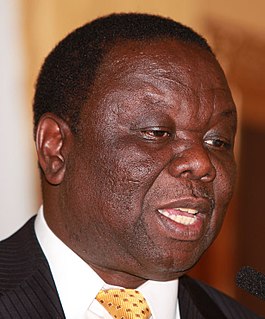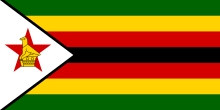
The economy of Zimbabwe shrunk significantly after 2000, resulting in a desperate situation for the country – widespread poverty and a 95% unemployment rate. Zimbabwe's participation from 1998 to 2002 in the war in the Democratic Republic of the Congo set the stage for this deterioration by draining the country of hundreds of millions of dollars. Hyperinflation in Zimbabwe was a major problem from about 2003 to April 2009, when the country suspended its own currency. Zimbabwe faced 231 million percent peak hyperinflation in 2008. A combination of the abandonment of the Zimbabwe dollar and a government of national unity in 2009 resulted in a period of positive economic growth for the first time in a decade.

Harare is the capital and most populous city of Zimbabwe. The city proper has an area of 960.6 km2 (371 mi2) and an estimated population of 1,606,000 in 2009, with 2,800,000 in its metropolitan area in 2006. Situated in north-eastern Zimbabwe in the country's Mashonaland region, Harare is a metropolitan province, which also incorporates the municipalities of Chitungwiza and Epworth. The city sits on a plateau at an elevation of 1,483 metres above sea level and its climate falls into the subtropical highland category.

Great Zimbabwe is a city, now in ruins, in the south-eastern hills of Zimbabwe near Lake Mutirikwe and the town of Masvingo. It was the capital of the Kingdom of Zimbabwe during the country's Late Iron Age. Construction on the monument began in the 11th century and continued until the 15th century. The edifices were erected by the ancestral Shona. The stone city spans an area of 7.22 square kilometres which, at its peak, could have housed up to 18,000 people. It is recognised as a World Heritage site by UNESCO.

Zimbabwe Rhodesia was an unrecognised state that existed from 1 June 1979 to 12 December 1979. Zimbabwe Rhodesia was preceded by an unrecognised republic named Rhodesia and was briefly followed by the re-established British colony of Southern Rhodesia, which according to British constitutional theory had remained the proper government after Unilateral Declaration of Independence (UDI) in 1965. About three months later, the re-established colony of Southern Rhodesia was granted internationally recognised independence as the Republic of Zimbabwe.

The Zimbabwe African National Union – Patriotic Front (ZANU–PF) is a centre-left political organization, which has been the ruling party of Zimbabwe since independence in 1980. The party was led for many years under Robert Mugabe, first as Prime Minister with the Zimbabwe African National Union (ZANU) and then as President from 1987 after the merger with the Zimbabwe African People's Union (ZAPU) and retaining the name ZANU–PF, until 2017 when he was removed as leader.

Provinces are constituent political entities of Zimbabwe. Zimbabwe currently has ten provinces, two of which are cities with provincial status. Zimbabwe is a unitary state, and its provinces exercise only the powers that the central government chooses to delegate. Provinces are divided into districts, which are divided into wards.

The Zimbabwe national cricket team is administered by Zimbabwe Cricket. Zimbabwe is a full member of the International Cricket Council (ICC) with Test and One Day International status.

The Zimbabwe national football team is the national team of Zimbabwe and is controlled by the Zimbabwe Football Association (ZIFA), formerly known as the Football Association of Rhodesia. The team has never qualified for the World Cup finals, and qualified for their first Africa Cup of Nations in 2004.
White Zimbabweans are people from the southern African country Zimbabwe who are White (Caucasian/European). In linguistic, cultural and historical terms, these Zimbabweans of European ethnic origin are divided between the English-speaking descendants of British and Irish settlers, the Afrikaans-speaking descendants of Afrikaners from South Africa, and those descended from Greek and Portuguese settlers.

Econet Wireless is a diversified telecommunications group with operations and investments in Africa, Europe, South America and the East Asia Pacific Rim, offering products and services in the core areas of mobile and fixed telephony services, broadband, satellite, optical fiber networks and mobile payment.

The Reserve Bank of Zimbabwe is the central bank of Zimbabwe headquartered in the capital city of Zimbabwe, Harare.

Emmerson Dambudzo Mnangagwa is a Zimbabwean revolutionary and politician who serves as the third and current President of Zimbabwe since 24 November 2017. A member of ZANU–PF and a longtime ally of former President Robert Mugabe, he held a series of Cabinet portfolios and was First Vice-President of Zimbabwe under Mugabe until November 2017, when he was dismissed before coming to power in a coup d'état. He was officially inaugurated as the third President of Zimbabwe on 26 August 2018 after narrowly winning the 2018 Zimbabwean general election.

Robert Gabriel Mugabe is a Zimbabwean revolutionary and politician who served as Prime Minister of Zimbabwe from 1980 to 1987 and then as President from 1987 to 2017. He chaired the Zimbabwe African National Union (ZANU) group from 1975 to 1980 and led its successor political party, the ZANU – Patriotic Front (ZANU–PF), from 1980 to 2017. Ideologically an African nationalist, during the 1970s and 1980s he identified as a Marxist–Leninist, although after the 1990s self-identified only as a socialist. His policies have been described as Mugabeism.

The Zimbabwean dollar was the official currency of Zimbabwe from 1980 to 12 April 2009. During this time, it was subject to periods of above-average inflation, followed by a period of hyperinflation.

Morgan Richard Tsvangirai was a Zimbabwean politician who was Prime Minister of Zimbabwe from 2009 to 2013. He was President of the Movement for Democratic Change – Tsvangirai (MDC-T) and a key figure in the opposition to former President Robert Mugabe.

The President of Zimbabwe is the head of state of Zimbabwe, elected by direct universal suffrage using a two-round system.

Visitors to Zimbabwe must obtain a visa from one of the Zimbabwean diplomatic missions or online unless they come from one of the visa exempt countries or are eligible for visa on arrival. As of November 2014 Zimbabwe and Zambia also offer a universal tourist visa.

On the evening of 14 November 2017, elements of the Zimbabwe Defence Forces (ZDF) gathered around Harare, the capital of Zimbabwe, and seized control of the Zimbabwe Broadcasting Corporation and key areas of the city. The next day, the ZDF issued a statement saying that it was not a coup d'état and that President Robert Mugabe was safe, although the situation would return to normal only after the ZDF had dealt with the "criminals" around Mugabe responsible for the socio-economic problems of Zimbabwe. Jacob Zuma, then-President of South Africa, phoned Mugabe and was told that Mugabe was under house arrest but otherwise "fine".
Protests began in Zimbabwe on 14 January 2019 following a 130% increase in the price of fuel imposed by the government of Emmerson Mnangagwa. Thousands of Zimbabweans protested against the price increase, along with increasing levels of poverty, the poor state of the economy, and declining standards of living. The government responded with a coordinated crackdown that resulted in hundreds of arrests and multiple deaths. The protests stopped after three days; by 17 January, businesses started reopening as the protests ended.


















